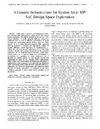Identificador persistente para citar o vincular este elemento:
https://accedacris.ulpgc.es/handle/10553/49289
| Título: | NASA: A generic infrastructure for system-level MP-SoC design space exploration | Autores/as: | Jia, Zai Jian Pimentel, Andy D. Thompson, Mark Bautista, Tomás Núñez, Antonio |
Clasificación UNESCO: | 3307 Tecnología electrónica | Palabras clave: | MP-SoC design System-level design space exploration NASA Algorithm design and analysis Topology |
Fecha de publicación: | 2010 | Publicación seriada: | 2010 8th IEEE Workshop on Embedded Systems for Real-Time Multimedia, ESTIMedia'10 | Conferencia: | 8th IEEE Workshop on Embedded Systems for Real-Time Multimedia, ESTIMedia'10 | Resumen: | System-level simulation and design space exploration (DSE) are key ingredients for the design of multiprocessor system-on-chip (MP-SoC) based embedded systems. The efforts in this area, however, typically use ad-hoc software infrastructures to facilitate and support the system-level DSE experiments. In this paper, we present a new, generic system-level MP-SoC DSE infrastructure, called NASA (Non Ad-hoc Search Algorithm). This highly modular framework uses well-defined interfaces to easily integrate different system-level simulation tools as well as different combinations of search strategies in a simple plug-and-play fashion. Moreover, NASA deploys a so-called dimension-oriented DSE approach, allowing designers to configure the appropriate number of, possibly different, search algorithms to simultaneously co-explore the various design space dimensions. As a result, NASA provides a flexible and re-usable framework for the systematic exploration of the multi-dimensional MP-SoC design space, starting from a set of relatively simple user specifications. To demonstrate the distinct aspects of NASA, we also present several DSE experiments in which we, e.g., compare NASA configurations using a single search algorithm for all design space dimensions to configurations using a separate search algorithm per dimension. These experiments indicate that the latter multi-dimensional co-exploration can find better design points and evaluates a higher diversity of design alternatives as compared to the more traditional approach of using a single search algorithm for all dimensions. | URI: | https://accedacris.ulpgc.es/handle/10553/49289 | ISBN: | 9781424490868 | DOI: | 10.1109/ESTMED.2010.5666979 | Fuente: | 2010 8th IEEE Workshop on Embedded Systems for Real-Time Multimedia, ESTIMedia'10 (5666979), p. 41-50 |
| Colección: | Actas de congresos |
Citas SCOPUSTM
41
actualizado el 08-jun-2025
Visitas
137
actualizado el 12-jul-2025
Descargas
191
actualizado el 12-jul-2025
Google ScholarTM
Verifica
Altmetric
Comparte
Exporta metadatos
Los elementos en ULPGC accedaCRIS están protegidos por derechos de autor con todos los derechos reservados, a menos que se indique lo contrario.
